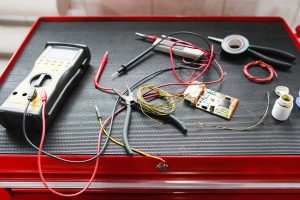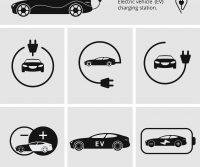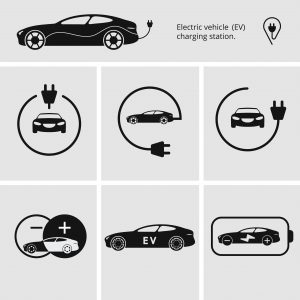Summer season is here
With the weather getting warmer we are starting to see more cars with A/C issues. Here is a Peugeot RCZ […]
READ MORE -
 Electric Vehicle Servicing, Maintenance and Repair – A question we are getting asked more and more is…. Do Electric cars still need the same vehicle servicing, maintenance and repair as a regular petrol or diesel car? Well the answer is simple. Yes they do.
Electric Vehicle Servicing, Maintenance and Repair – A question we are getting asked more and more is…. Do Electric cars still need the same vehicle servicing, maintenance and repair as a regular petrol or diesel car? Well the answer is simple. Yes they do.
For many the worry is how to find the right trained mechanic to fix their car. It is fair to say most mechanics are trained to work with regular internal combustion engines, but don’t have the equipment or staff training to maintain and service electric vehicles. However, just like when you have auto electric faults with your current vehicle, the idea is to find a good auto electrician to deal with these issues. Most experienced car or vehicle electrics specialists will be routinely upskilled themselves in the new requirements and equipment needed to help you.
Again the anwer is simple…Yes they do.. Just like a regular vehicle, an electric car will need to go on for an MOT annually after it is 3 years old. The GOV.UK website can be a source of confusion for drivers as it lists ‘good vehicles powered by electricity’ under vehicles exempt from MOT – however, this does not cover electric cars. So make sure you keep a record or check with your local garage what you will need for your mot
Initially this is always hard to answer, because all vehicles are different and will vary in cost for their servicing and general maintenance. What I have noticed is that with electric motors, and their simplicity and overall low maintenance you could find yourselves with considerably lower maintenance costs saving you literally hundreds over the year.
At Widnes Auto Electrical, our auto electrician have received specialist training to work competently on electric vehicles – we also have all the necessary testing and safety equipment in-house to carry out servicing and repair on electric vehicles. To find out more about how we can help feel free to give us a call or call into our auto-electrical repair centre in Widnes

We know that a lot of people need consistent maintenance to their vehicles, and that doesn’t fall short in terms of Alternators. That’s why we at Widnes Auto Electrical are here to provide you with all of your needs in regards to Alternators, so don’t you worry people of St Helens.
The Alternators primary function is to keep your battery charged. As well as that, it also provides your car with all of the means to be able to run things related to electricity. A tip to look out for, is lights can be dimmer, wipers slower and various warning lights on the dash because low voltage can cause many systems to fail. If this happens then pop into our workshop and let us test your car for you and we can sort your problems out quickly and cheaply.
Need an alternator repair in St Helens for your car or van? Make your alternator repair quick & easy by calling into our auto electrical repair centre in Widnes.

 Are the combustion engines days numbered? Is this the beginning of the end for the diesel and petrol engine? Lets find out….
Are the combustion engines days numbered? Is this the beginning of the end for the diesel and petrol engine? Lets find out….
Significant gains in battery technology favour electric motors moving into the future. Current electric cars, powered by lithium-ion batteries, can reach ranges of almost of 300 miles on a single charge Tesla fans recently drove a Model S more than 700 miles in one go. Straight away this takes away the more recent questions and concerns around how far you can drive without needing to stop versus a diesel or petrol car.
Many thought leaders actually believe the “total cost of ownership” of an electric car will reach parity with a petrol one next year. Predictions are being made that electric vehicles will make up 14% of global car sales by 2025. Regulations are tightening, too. Last month the UK joined a lengthening list of electric-only countries, saying that all new cars must be zero-emission by 2050.
Electrification has thrown the car industry into potential chaos. Many leading brands are founded on their engineering heritage—especially in Germany. Compared with existing vehicles, electric cars are much simpler and have fewer parts; they are more like computers on wheels. That means they need fewer people to assemble them and fewer subsidiary systems from specialist suppliers.
While today’s carmakers grapple with their costly legacy of old factories and swollen workforces, new entrants will be unencumbered. Premium brands may be able to stand out through styling and handling, but low-margin, mass-market carmakers will have to compete chiefly on cost. Ultimately, what this means is, new competition in the industry from players such as Apple and Google will drive the cost down, and through innovation, the quality of Electric vehicles up.
Driverless electric cars in the 21st century are likely to improve the world in profound and unexpected ways, just as vehicles powered by internal combustion engines did in the 20th. But it will be a bumpy road. Buckle up. Follow our latest news to keep up with all the changes to the world of electric cars!
A lot of learners are caught out during the test, because they aren’t aware of the difference! Whats worse is that fact that you are probably reading this document because you have passed your test either recently or some time ago and despite being on the roads every day you no longer know what the rules are!
Thinking distance is the distance that the car travels after the driver has seen the danger and before the brakes are applied.
Some peoples reactions are faster than others, but the average distance it takes before the driver realises the danger ahead is 20 feet, when travelling at 20 mph.
The distance that the car travels whilst braking. With the brakes applied the car slows down, and the average car will travel 20 feet before coming to a complete stop, when travelling at 20 mph.
The Overall Stopping Distance is a combination of the 2 above.
When trying to visualise a distance it is useful to remember that the length of an average car is approximately 15ft, therefore, 75ft would be about 5 car lengths away.
The Overall stopping distance when travelling at 20mph is 40 feet (12 metres).
This is made up of: (thinking distance: 20 ft (6 m)) + (braking distance: 20 ft (6 m))
The Overall stopping distance when travelling at 30mph is 75 feet (23 metres).
This is made up of: (thinking distance: 30 ft (9 m)) + (braking distance: 45 ft (14 m))
The Overall stopping distance when travelling at 40mph is 120 feet (36 metres).
This is made up of: (thinking distance: 40 ft (12 m)) + (braking distance: 80 ft (24 m))
The Overall stopping distance when travelling at 50mph is 175 feet (53 metres).
This is made up of: (thinking distance: 50 ft (15 m)) + (braking distance: 125 ft (38 m))
The Overall stopping distance when travelling at 60mph is 240 feet (73 metres).
This is made up of: (thinking distance: 60 ft (18 m)) + (braking distance: 180 ft (55 m))
The Overall stopping distance when travelling at 70mph is 315 feet (96 metres).
This is made up of: (thinking distance: 70 ft (21 m)) + (braking distance: 245 ft (75 m))
Please note: Information is for guidance only – for up to date accurate information please check your highway code. Official guidelines can be found at https://www.gov.uk/guidance/the-highway-code/general-rules-techniques-and-advice-for-all-drivers-and-riders-103-to-158

Jaguar will stop producing the XJ in July so that it can focus on producing an all-electric version. The current model is a favourite of British politicians, and is frequently the car of choice of the Prime Minister. The current X351 model has been on sale since 2009, when the Jaguar XJ debuted with an all-new aluminium structure.
The British manufacturer has confirmed that the final XJ will roll off the Castle Bromwich production line on July 5 – with more than 120,000 versions produced over the last decade.
A facelifted model went on sale in 2015 with revised styling and a much-improved infotainment system on offer, while 2017 saw the introduction of a powerful XJR model, which produced 567bhp.
And last year Jaguar unveiled the XJ50 – a special edition marking 50 years since the original went on sale in 1968. This features unique XJ50 branding, unique 20-inch alloy wheels and a gloss walnut veneer interior trim.
The firm’s flagship model is available in standard or long wheelbase versions, and it comes with just one engine an offer, a 296bhp 3.0-litre V6 diesel, which proves a great match for the XJ. Prices start from £62,400, and rise to £83,145 for the range-topping XJ Autobiography.
From <https://www.carkeys.co.uk/news/curtain-falls-on-jaguar-xj-to-make-way-for-electric-model>

Even though Brexit is was delayed the factories still closed and production fell over 40% according to to the SMMT who claimed only around 70,000 cars came of the production line; that was 56,999 fewer than in April a year ago.
The SMMT said car firms had brought forward their annual stoppages normally scheduled for the summer holidays.
It said the shutting of factories was part of a raft of costly measures, including stockpiling, training for new customs procedures and rerouting of logistics. It said the factories would not be able to repeat the process for the new 31 October Brexit deadline set by the European Union.
Mike Hawes, SMMT chief executive, said: “Today’s figures are evidence of the vast cost and upheaval Brexit uncertainty has already wrought on UK automotive manufacturing businesses and workers.
“Prolonged instability has done untold damage, with the fear of ‘no deal’ holding back progress, causing investment to stall, jobs to be lost and undermining our global reputation.”
Global slowdown
The stoppages in the factories have exacerbated a continuing slow down in the global car industry caused by the trade tensions between the US and China, uncertainties over the arrival of electric and self driving cars, and tougher environmental controls after the VW emissions scandal.
April was the 11th consecutive month of output falls in the UK.
In the year to date, 127,240 fewer cars have been built compared with the same period in 2018 – a decline of more than a fifth.
The SMMT estimated production for the whole of 2019 would be about 10% down on last year. It said the market might pick up by the end of the year if there was a favourable deal between the UK and the EU and a substantial transition period to adapt to trading outside the single market.
But it said a no-deal Brexit would make the declines worse with the threat of border delays, production stoppages and additional costs.
Mr Hawes said: “This is why ‘no deal’ must be taken off the table immediately and permanently, so industry can get back to the business of delivering for the economy and keeping the UK at the forefront of the global technology race.”
The Department for Business, Energy and Industrial Strategy said: “The Government wants to see the UK automotive sector continue to grow and attract further investment.
“Through our modern industrial strategy we continue to invest in the future of our automotive industry, including £1bn for research and development into cleaner vehicles, and the Faraday Battery Challenge to develop the next generation of car battery technologies in the UK.”

Around 1,000 companies in the UK car-accident repair industry ‘could be on the brink’ of collapse within two weeks of a Brexit no-deal, business leaders have warned It could mean the cost of getting your car repaired goes up – as parts become more difficult to come by. Many other companies could be forced to close within a month, an industry meeting of 17 firms heard.
Body shops that repair cars in accidents face a very uncertain future, business leaders warn
Body spraying a panel in a body shop – the Government has been accused of doing very little to help the industry which depends on speed at the border
New border checks risk slowing down business dramatically for an industry which relies on getting car parts in quickly from abroad, including Europe.
The Government is facing calls to take a ‘no-deal’ Brexit off the table from the car industry
According to car industry experts, the car repair industry had been ‘severely underinvested in for many, many years’ and therefore didn’t have the reserves to step up to the difficulties of a no deal – if the supply chain was hit with delays. Meanwhile Kate Goodwin, who fronts the repair programme and supply chain at The Innovation Group, an organisation which supports industry, added: ‘Repairers don’t get paid until a repair is completed, margins are tight.
According to the government the priority is to deliver a deal that will protect UK jobs and prosperity and provide certainty for businesses as we leave the EU. The Government is preparing to ensure the country is ready for every eventuality.

A survey has found that just over half of Brits are not able to do basic checks on a car, such as a tyre change or checking coolant levels.
According to Tyre Shopper found that almost half of the 2000 asked didn’t know how to change a car tyre or check the coolant levels in their car. This appeared to be even more so when asking those under the age of 25’s compared to the over 55’s
The survey found that many of the youngsters didn’t have a clue and would always ask their parents to help them out with car issues; fathers were the most asked by almost double compared to those asking their mums for help with car maintenance issues.
After asking parents, next inline tended to be Google with almost 1 in 3 searching online for answers.
Vehicle Radio Decoding Widnes – All/most vehicle radios come with anti-theft prevention software built into them. These pieces of software deny the use of the car’s radio if the software thinks it has been maliciously tampered with. Although in many cases the software prevents the radio from working even if the battery has been disconnected from the car or if another piece of work has been done to the care involving its electronics.
When this happens and nobody has maliciously tampered with it, it can be very annoying. To overcome this issue, you would need to locate the serial number of your vehicle (usually found on the bottom chassis of the car) or in any documentation that you got when you purchased your car. This code would then be entered into our database and the correct 4 digit pin would appear, once this has been entered into your radio, your car radio will be working again.
Although this is a very simple procedure, a lot of mechanics and companies try to milk as much money from you by saying you need to buy a number of different things. Here at Widnes Autoelectrics, we will tell you what you need to do/ what we need to do straight, with no hidden extras. If you have a problem with your vehicles electronics and you don’t know what to do or you don’t have the time to fix them, then you may want to get into contact with us to see what we can do for you and how much for.
If you are interested in our Vehicle Radio Decoding Widnes or you would like some more information on our other services, then please don’t hesitate to get into contact with us and a member of our friendly team will be in touch with you as soon as they can.

Most people think they need to check their car or motor vehicle in the winter or when its MOT or service is due. However, throughout the year, its important that you take care of your motor vehicle to ensure it remains in good working. This way your motor will remain safe, reliable and at is most fuel efficient on the road
Having said that, many car owners neglect their vehicle, and this can result in poor running performance and accidents. Fortunately, there are basic checks and maintenance tasks you can carry out to keep your motor vehicle at is best.
It is important that your car is running on a good set of tyres and this will make sure that the car is driving safely.
Every 2 to 4 weeks it’s a good idea to check tyre pressure and your tread. This will ensure you stay safe and inside the legal limits for driving.
Every month or so, you should check your engine oil as vehicles its not uncommon for cars to use up to a litre of oil every 1,000 miles. Do not wait until the warning light comes on as damage may have already occurred by then so check that you are always in between the minimum and maximum amount (overfilling can also cause damage).
Experts recommend that you check your water and coolant every couple of weeks ensuring your coolant is between the minimum and maximum amount. You should always do this when the engine is cool. If you think its unusually low this could be a sign of a leak. Take it to your nearest garage
Lights
It’s worth checking your lights are in good working order at least every week or 2. You will usually find if you are driving a modern vehicle then you will just need to check your onboard computer. A warning light will normally appear. If not, check manually by cleaning any dirt of and make sure they are bright and clear on the road.
This is one of the simplest things to do. Simply keep an eye out for any damage such as cracks or chips. There have been numerous occasions in the past were people have simply not bothered to repair them and the chip has led to the windscreen smashing and causing accidents. Often your insurance will fix these for you without you losing any no claims either!
The wipers should always be cleaned whenever you clean your car to prevent smearing. Many motorists like to replace their wipers once a year and this is a good practice as they are cheap and easy to replace.
Screen wash
With the warm summer weather on the way, it becomes breeding season for the bugs and flies that love to hit your windscreen on those country roads. Before you know you will run out of screen wash from constantly clearing away the bugs.
As such, check and top up your screenwash on a weekly basis as it is required by law to work properly. It is particularly important to check on a regular basis if you drive in muddy conditions or if you are about to set off for a long drive.
Once a year you should take a look at the toolkit/emergency kit that you have to make sure that you have everything you need. Ideally this should include a spare wheel, locking wheel nut, a jack, water, food, warm clothing, a blanket etc.
Check that all of the electric work in the car on a weekly basis. This can be easy enough to do whilst you are driving or simply when you are parked – any problems should be fixed as soon as possible. Bring it in to Widnes Auto Electrical if you have any concerns